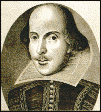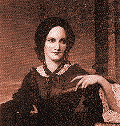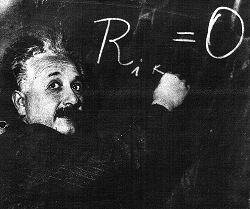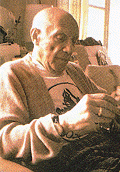The ancient art of interpreting numbers answers to a deep-seated human need to find meaning in even the most commonplace things and events HILDI HAWKINS explains the procedures and theories of the numerologists
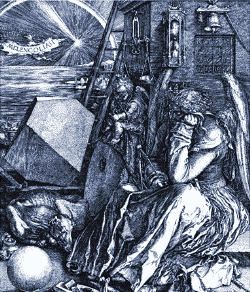 |
| Above: a magic square - a number array
in which rows, columns and diagonals add up to the same total - is shown
behind the gloomy figure in Dürer's engraving Melancolia (1514). Such
squares, epitomising the mystical properties of numbers, have often been
used as magic talismans |
CAN NUMBERS REVEAL the future? Or show the hidden aspects of
a person's character? Practitioners of the ancient art of
numerology believe they can.
Numerology is a method of making names, dates or events correspond to numbers
- generally between one and nine, although sometimes 11 and 22 are included
in the system. Each number has a certain significance: William Shakespeare
corresponds to five, the number of versatility and resourcefulness.
The correspondence is established by a very simple identification of the
letters of the alphabet with numbers according to the 'Hebrew system',
as numerologists call it (see table).
To find your number, simply write down the number corresponding to each letter
of your name, and add them together. If the resulting number is over nine,
add up its digits and keep doing this until the result is less than 10. For
instance, the letters of the name Charlotte Brontë add to five (Charlotte
- 3+5+1+2+3+7+4+4+5 = 34; Brontë=2+2+7+5+4+5 =25; 34+25= 59;5+9=14;
1+4=5.)
If the digits corresponding to your name add up to one, you
are probably a dominant kind of person, a leader. 'Ones' are pioneers, inventors,
designers - but they often put their plans into practice with little regard
for the way they will affect the people most directly involved. They tend
to dominate everyone they meet, they rarely have close friends and are sometimes,
despite their confident appearance, very lonely people.
Two is interpreted by modern numerologists as the number of
passive, receptive people. 'Twos' are quiet, unambitious, gentle, kind, tidy
and conscientious. They often get their own way, however, by gentle persuasion
rather than force. They are inclined to be hesitant, to make problems for
themselves by putting off decisions for no good reason, and this quality
can lead them into difficult situations.
The 'Hebrew' numerological system |
|||||||
| 1 | 2 | 3 | 4 | 5 | 6 | 7 | 8 |
| A | B | C | D | E | U | O | F |
| I | K | G | M | H | V | Z | P |
| Q | R | L | T | N | W | ||
| J | S | X | |||||
| Y | |||||||
Three is one of the most extrovert numbers, belonging to
intelligent, creative and witty people, who generally make friends easily
and seem to succeed at anything to which they turn their hands. They are
proud, ambitious and pleasure-loving, but their great weakness lies in their
inability to take anything - ideas or people - seriously for very long.
Four, like two, is a number corresponding to dependable,
down-to-earth people. They are born organisers. They lack the volatility
of 'ones' and 'threes', but they make up for this by their fairness and
meticulous attention to detail. They may be subject to sudden irrational
rages or depressions that seem extraordinary in people who are usually models
of calmness, Four has traditionally been regarded by numerologists as the
number of ill-luck; people whose number is four often seem to pay dearly
for any success they achieve in life.
Five is the number of bright, fast-moving, clever, impatient
people. They live on their nerves, and love meeting people and seeking out
new experiences. They are often physically attractive but rather feckless,
hating to be tied down. Five is the number that represents sex (the digits
of which also add up to five), and people whose number is five often have
varied and exciting love-lives, often problematic. Sometimes the sexual side
of their nature shows itself in excesses or perversions.
People whose number is six are among the happiest of the whole
numerological system. They are happy, tranquil, well-balanced and home-loving.
They are affectionate, loyal, sincere and conscientious. They are not uncreative;
many of them are successful in the performing arts. The negative aspect of
their character is their tendency to be rather fussy, conceited and
self-satisfied.
Seven is the number of the loner, the introspective scholar,
philosopher, mystic or occultist. These people tend to stand aside from the
mainstream of life, content to observe it. They are dignified, self-controlled
and reserved. They tend to be indifferent to worldly wealth but, while they
may seem aloof and stand-offish, make loyal friends. Despite their powerful
intellects, they are often surprisingly bad at putting their thoughts into
words, and may even dislike discussing them if they feel their ideas are
being challenged.
Eight represents worldly success, and people who have this number
often make successful businessmen, politicians or lawyers. Their success
is, however, often built on a great deal of hard work, which is often done
at considerable expense to their warmer, more human qualities. They often
seem to be hard, egocentric and grasping; but there can be, behind the
unsympathetic exterior, a whimsical streak that endears them to other
people.
Nine stands for the height of intellectual and spiritual
achievement. People whose number is nine are the idealists, the romantics,
the visionaries - poets, missionaries, doctors, religious teachers, brilliant
scientists. Their great qualities are their unselfishness, their self-discipline
and their determination. Their idealism is concerned with mankind as a whole
- in their everyday lives they may be inclined to seek the limelight,and
to be fickle friends or lovers.
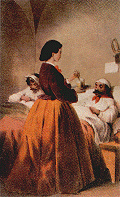 |
Eleven is the number of those with a strong sense of vocation
from leaders such as Churchill (right) to reformers such as Florence Nightingale
( left). |
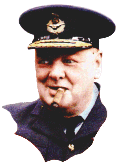 |
Some numerologists also employ the numbers
11and 22. They believe that these numbers represent
a higher plane of experience than the numbers one to nine. Eleven is the
number of those who experience revelations and suffer martyrdom; those with
names that add up to this number are often people with a strong vocation
for their work - preachers, doctors, nurses or teachers. They tend to prefer
ideas to real people.
Twenty-two is the 'master' number: people whose names add to
22 combine the best qualities of all the other numbers.
Apply this procedure to the name you were given at birth and you will find,
numerologists claim, the characteristics you were born with and that will
underlie your personality throughout your life; apply it to the name you
apply to yourself, or would like to have, and you will discover how your
experiences in the world have moulded your personality. Using a nickname,
you will be able to ascertain what your friends think of you. Comparing her
maiden and married names, a married woman can find out how married life has
changed her.
The total of vowel numbers in your name
is your heart number, which shows your inner character; the total of consonants
is your personality number, which indicates your outward personality, or
the impression you make on the people around you. (This distinction is derived
from Hebrew, in which only the consonants
of any word are actually written down; the vowels are therefore 'hidden',
and represent the aspects of the personality that are not outwardly apparent.)
Like the character types suggested by the sign of the zodiac
you were born under, the traits indicated by these numbers are to be regarded
as indicating a general type, not a detailed description. But that people
whose names add to the same number share certain personality traits can be
supported with numerous examples: the letters of the names Winston S. Churchill,
Einstein, Pablo Picasso and Florence Nightingale, for instance, all add to
11 - the number of those with strong vocations.
The same technique can be applied to the names of cities, and
many of the results seem to confirm the beliefs of numerologists. London
adds up to five, indicating manysidedness and resilience; New York to three,
indicating brilliance and glitter. The ancient cities of Oxford and Cambridge
both have the number seven - the number of the aloof, inward-turned scholar
.
But the ridiculous extremes to which numerology can be taken
are indicated by the prediction of an American numerologist that, since Oakland,
California, shares the number nine with Chicago, it will one day suffer a
great fire, as did Chicago in 1871.
Numerology extends to the character of a year, a decade or a century. The
present century carries the number one (1+9+0+0=10; 1+0=1) and, according
to numerologists, should be an ebullient time of invention and discovery
dominance and subjugation. All of this could be said to be true, although
(here lies the weakness of the loose collection of attributes associated
with each number) it could he regarded as equally true of the 19th century.
The year 1979 was characterised by the number eight 1+9+7+9=26; 2+6=8). According
to numerologists, it should have been a year when financial and political
matters went exceptionally well. The 19805 are the ninth decade and should
be charactensed by nine, with great achievements in the arts and the world
of learning.
Past decades are depicted by numerologists as confirming their theories:
the brilliant 1920s, a 3-decade, followed by the more subdued 1930s, overshadowed
in its latter half by the threat of war; the recovery of confidence of the
19405 and the self-assurance of the 6-decade of the 1950s; the dreaming
withdrawal into mysticism of the 1960s, characterised by the number seven,
and the hardening up of attitudes in the money-conscious 1970s, reflected
in its number, eight. But this appropriateness is in the eye of the beholder:
for example, some might view the 1950s, which saw the appearance of the H-bomb
and rock'n'roll, and the intensification of the cold war, as badly represented
by six (happy, tranquil, balanced).
Numerologists believe that numbers can be used to suggest beneficial courses
of action. If your number is seven, for example, you should take care to
make difficult decisions or perform important tasks on days of the month
that add up to seven: the seventh, the 16th and the 25th. People whose names
add up to eight should eat plenty of oranges, since the word oranges adds
up to eight -but presumably never a single orange at a time! Certain years,
too, can be good or bad for an individual; to find your year-number, add
your month and date of birth to the current year: 1981, for instance, is
a 9-year for someone born on 24 February 1956 (24+2+ 1981 =2007; 2+0+0+7=9),
indicating it is a year of high spiritual and intellectual achievement.
Why should the numerological system work? Numerologists are
quick to point out instances that seem to show the importance of number,
such as the career of Louis xiv of France, He came to the throne in 1643,
which adds up to 14; he died in 1715, which adds up to 14, at the age of
77 - which adds up to 14, But is this any more than coincidence?
Numerologists counter this question by claiming that there is no such thing
as coincidence. They believe the Universe is
like a vast harp with countless strings,
each vibrating at a certain rate, characterised by a number. Number,
they believe, is at the root of all things and they point out that science
has found that light, sound, atomic structure and many other things are dependent
on frequency, or number. But what of the objection that, even if this view
of the Universe is correct, basing the system on a person's name must be
wrong, since the naming of a child is largely a matter of the personal
tastes and whims of the parents? The numerologists
have their answers ready; as Florence Campbell, an American, explains:
The Soul has taken many journeys in the past
and knows its present needs. The Soul wants progress upwards on the Great
Spiral and chooses for the incarnating ego the vowels whose total shall
accomplish this purpose. There is a long 'Dark Cycle' before the child
is born, and during this Dark Cycle the vibrations that are to label the
new life are so impressed upon the subconscious minds of the parents that
they are compelled to carry out the plan.
In other words, the numerologist believes that the name each person carries
is no accident, that it tells something significant about its bearer, in
a code to which the numerologist has the key.
On page 1326: how Greeks, Jews and Christians believed
number underlay all reality

